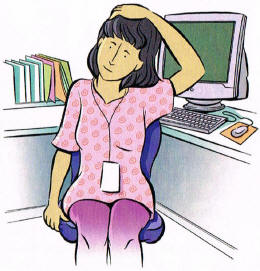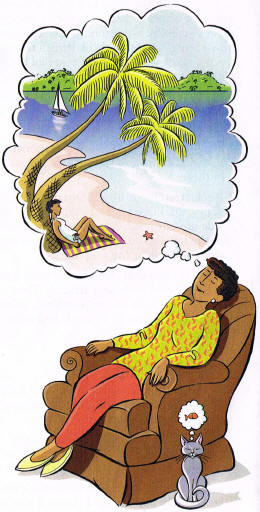Stress
(Part 3) |
Use Your Support Networks
Talking about a problem can often help you feel better.
So when
you're under stress, try spending time with family and
friends.
Or see a professional you trust. People who
care about you
can help you see things in a whole new light.
|
Those Who Care
Sometimes stress feels like it's the most important thing in your day.
But it's not. Talking to friends and family can remind you how much more
there is to life.
●
Friends.
A great thing about friends −and even
pets− is that they are there when
you need them.
Sometimes you just need a friend to listen.
Other
times a friend can offer a new view to an old
problem. And
every laugh you share with friends is
a cure for stress.
● Family. In
stressful times, family can be a source
of strength and support.
They probably know you
better than anyone, and can share in both your
joys
and disappointments. Time with your family
can also help combat
feelings of loneliness or
helplessness.
Professionals
You Can Trust
If your stress and anxiety don't seem to go away,
it may help to talk with
a professional. This could be a counselor, clergy, social worker,
even your family doctor. Also, many companies offer an Employee
Assistance Program (EAP).
A professional can provide support and
guidance for what you're going through.
|

|
|
Relieve Stress with Activities
When you're feeling stressed, some simple exercises can provide
relief
right away. This doesn't mean you need to put on your sweatpants,
though. These exercises are all about feeling more relaxed.
|
|


|
Walking
Taking a walk is a great way to fight stress. Walking offers a
chance to take a break from a stressful situation.
It can also give
you a few minutes to think things through. Even a short walk can
help you feel better. That's because walking
is a positive action
that you control.
Stretching
Muscle tension is a common response to stress.
Stretching is a
simple way to loosen up. Try these:
●
Neck
stretch.
Sit up straight and tuck in your
chin. Place your left hand on the
right side of your
head. Gently pull your head to the left and hold
for 10 seconds. Switch sides and repeat the
exercise.
●
Shoulder and
arm stretch. Put your
hands
together and lock your fingers. Then raise your
hands above your
head, palms upward. Hold for
15 seconds and relax. Repeat 3 times.
Deep Breathing
Deep breathing is a simple method for relieving tension. Use 3 deep
breaths each time you do
this exercise.
●
Inhale.
Breathe in slowly and deeply through your
nose. Take in as much air
as possible. Hold for 3
seconds... then exhale.
●
Exhale. Breathe out
slowly through your mouth.
Try pursing your lips as if you were going to
whistle. This helps control how fast you exhale.
|
|
Get Focused on Relaxation
Focusing the mind helps provide stress relief. Taking 5 to 10
minutes to practice
relaxation each day helps you feel refreshed. The following
exercises can be done
almost anywhere. Try one or more until you find what works best for
you.
|
Calm Your Mind
Find a quiet place where you won't be disturbed. Then try the
following:
●
Sit comfortably. Take off your shoes. Turn off
your cell phone. Take a few deep breaths.
● Focus your
mind on one peaceful thought, image
or word. Then try to hold that thought for 5
minutes.
●
When other thoughts enter your mind, relax and
refocus. Let the invading thoughts fall away.
● When you're done, stand up slowly and stretch
your arms over your head. With practice, this
exercise can help you feel restored.
Visualization
Visualization is like taking a mental vacation. It frees your mind
while keeping your body in a calm state.
To get started, picture yourself feeling warm and relaxed.
Choose a peaceful setting that
appeals to you and fill in the details.
If you imagine a tropical beach, listen to the waves on the shore.
Feel the sun on your face. Dig your toes in the sand. By using
the power of your mind, you can take a soothing break when you need to.
|
 |
|

|
Calm Your Body
With practice, you can use mental cues to tell your body how to feel.
●
Sit comfortably and clear your mind. A few deep
breaths will help.
● Mentally focus on your left hand and repeat to
yourself: "My left hand feels warm and heavy".
Keep doing this until your hand does feel heavier
and warmer.
●
Repeat the exercise using your right hand. Then
focus on your arms, legs and feet, until your whole
body feels relaxed.
●
When you're done, stand up slowly and stretch your
arms overhead.
|
Putting It All Together
When it comes to relaxing, there's no right or wrong way to do it.
Instead, it's more important to find what works best for you. The
more you practice,
the easier it is to relax −even when the checkout line
seems unending.
You may also find that a combination of exercises
works best for easing your stress. If you have an interest, you may
want to read books about meditation and other relaxation techniques.
|

|
|
Take Care of Yourself
Managing stress is easier if you take good care of yourself.
Make time
for rest and recreation. Eat healthier meals. Take a walk now
and then.
And don't forget to treat yourself. A little down time can go a long
way.
|
Get Enough Rest
A good night's sleep, or even a nap, can make
the whole world look
better. Rest prepares your mind and body to deal with daily
challenges. It's also important for overall health. To
improve
your sleeping habits, try the following:
●
Get up at the same time each day, even on
weekends.
● Avoid caffeine late in the day. And limit alcohol
before bed.
●
Spend some quiet time, or listen to soothing
music, before going to bed.
|
Treat Yourself
Everyone needs a break now and then. So allow yourself some time
each week for having fun. Even simple things, like a warm bath or
an evening with a loved one, can help. What you do is not
as
important as how you feel doing it.
Pick something that produces
good feelings. Whether it's a hike in the woods or a night
on the town,
treat yourself once in a while.
It's hard to feel stressed when
you're having fun.
|
|

|
Make Time for a Healthy Diet
Under stress, you may eat junk food, grab meals
on the run, or eat more
or less than you should.
But having a balanced diet is vital for
good health.
It also helps you feel better during stressful times.
How and when you eat are important, too.
To get more out of your
meals, try the following:
●
Don't rush. Take time to prepare and eat healthy
foods.
● Eat a variety of foods, including plenty of fresh
fruits and vegetables.
●
Sit down to eat with family or friends a few times
each week.
|
Get Active
Regular exercise helps ease tension in both mind and body. To get
started, pick an activity you enjoy and can do a few times a week.
There are lots of activities to choose from. Just make sure it's
something that helps you feel better. This might be riding a
bicycle, throwing a frisbee or playing softball with your friends.
Try taking a walk after dinner instead of watching TV. Sometimes,
a stroll
to the corner park is all it takes.
|
|

|
|
You Can Manage Stress
Stress may be a fact of life, but it doesn't have to be a way of
life.
With a little effort, you can learn to let go of stressful ways of
thinking.
You can also learn methods to help you relax. Then it will be easier
to face stressful events with a healthy attitude. You
can
feel better!

Top of Page
|


![]()
![]()